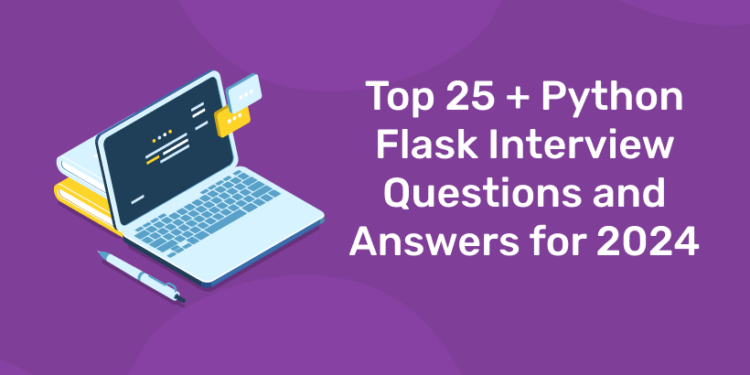Table of Contents
Flask is a lightweight web framework in Python, designed for simplicity and flexibility in web development. It enables creating web applications quickly and efficiently by providing essential tools and libraries. Flask follows a minimalistic approach, allowing developers to build web applications with fewer restrictions and a simple yet powerful foundation. It offers features like URL routing, template rendering, and HTTP request handling. Flask’s modular design allows easy integration of additional extensions for various functionalities. In this article we will discuss Top 25 + Python Flask Interview Questions and Answers for 2024.
Top 25+ Python Flask Interview Questions and Answers for 2024
1. What is Flask?
- Flask is a micro web framework for Python used to build web applications. It is lightweight, modular, and provides the essentials to create web applications without imposing restrictions or dependencies.
2. Explain the difference between Flask and Django.
- Flask is a micro-framework, offering more flexibility and customization, while Django is a full-stack framework with many built-in features and a more opinionated approach.
3. How to install Flask?
- You can install Flask using pip, the Python package manager, by running the command: pip install Flask.
4. Explain the routing in Flask.
Routing in Flask refers to associating different URLs with functions in Python code. For example:
Program
from flask import
Flask app = Flask(__name__)
@app.route(‘/’)
def index():
return ‘Hello, World!’
@app.route(‘/about’)
def about():
return ‘About page’
if __name__ == ‘__main__’:
app.run()
5. What is a blueprint in Flask?
- Blueprints in Flask are used to organize and group related views, templates, and static files. They help in modularizing large applications by dividing them into smaller components.
6. Explain Flask extensions.
- Flask extensions are additional libraries that enhance Flask’s functionality by providing extra features. Some popular extensions include Flask-SQLAlchemy for database operations, Flask-Login for user authentication, and Flask-WTF for form handling.
7. How does Flask handle HTTP requests?
- Flask uses decorators like @app.route() to map URLs to view functions. When a request is made to a specific URL, Flask invokes the corresponding view function and returns the response.
8. What is Jinja2 and how is it related to Flask?
- Jinja2 is a powerful and widely used template engine for Python. Flask uses Jinja2 as its default template engine, allowing developers to create HTML templates with placeholders and dynamic content.
9. Explain Flask’s context global.
- Flask provides three contexts: application context (current_app), request context (request), and session context (session). These contexts store information globally for the duration of the request-response cycle and allow access to certain variables and resources.
10. How does Flask support secure web development?
- Flask provides features such as secure cookie handling, CSRF protection (with Flask-WTF), password hashing, and various security-related extensions to ensure secure web development practices.
11. What is Flask-WTF?
- Flask-WTF is a Flask extension used for handling web forms. It provides form validation, CSRF protection, and other utilities for managing forms in Flask applications.
12. Explain Flask-SQLAlchemy.
- Flask-SQLAlchemy is an extension that integrates SQLAlchemy, a popular SQL toolkit and Object-Relational Mapping (ORM) library, with Flask. It simplifies database operations by allowing developers to work with databases using high-level Python objects.
13. What is a Flask context?
- Flask context refers to the context within which Flask-related operations occur. There are mainly two contexts: Application Context (current_app) and Request Context (request). Application context holds information related to the application, while the request context holds information related to the current HTTP request.
14. How to handle errors in Flask applications?
- Flask provides error handling using decorators such as @app.errorhandler() to define custom error pages or responses for different HTTP error codes or exceptions. For instance:
Program
@app.errorhandler(404)
def not_found_error(error):
return render_template(‘404.html’), 404
15. What is Flask-RESTful?
- Flask-RESTful is an extension that simplifies the creation of RESTful APIs in Flask applications. It provides tools and features to build APIs with support for endpoints, request parsing, and resource management.
16. Explain Flask sessions and how they work.
- Flask sessions are used to store user-specific information across multiple requests. They use cookies to store session data securely on the client-side, and the server-side stores a signed version of the data. Session information is accessible through the session object.
17. What are middlewares in Flask?
- Middlewares in Flask are functions or components that intercept the request and response cycle. They can modify the request or response objects, perform additional processing, or add custom functionality to the application.
18. How can you handle file uploads in Flask?
- Flask provides the request.files object to handle file uploads. It allows accessing uploaded files sent with a POST request. For instance:
Program
from flask import request
@app.route(‘/upload’, methods=[‘POST’])
def upload_file():
uploaded_file = request.files[‘file’]
# Process the uploaded file
return ‘File uploaded successfully’
19. Explain Flask’s before_request and after_request decorators.
- @app.before_request and @app.after_request are decorators used in Flask to execute functions before and after each request, respectively. They can be used for tasks such as setting up database connections, authentication, or modifying responses.
20. What is Flask-Login and how does it work?
- Flask-Login is an extension that provides user session management and authentication support for Flask applications. It allows developers to manage user login/logout, session handling, and access control by integrating with user models and managing user sessions securely.
21. Explain Flask’s request lifecycle.
- Flask’s request lifecycle involves various stages such as receiving an HTTP request, matching the URL to a view function, executing the view function, generating a response, and sending it back to the client. Understanding this lifecycle helps in comprehending how Flask handles incoming requests and generates responses.
22. What are Flask templates? How are they rendered?
- Flask templates are files containing HTML and placeholders for dynamic content using Jinja2 syntax. They are rendered by the render_template() function provided by Flask, which replaces the placeholders with actual data to produce the final HTML output sent to the client.
23. How can you handle authentication in Flask applications?
- Authentication in Flask can be implemented using various methods such as Flask-Login for session-based authentication, JSON Web Tokens (JWT) for token-based authentication, OAuth for third-party authentication, or custom authentication mechanisms using decorators and user models.
24. Explain Flask’s context locals.
- Flask’s context locals (g, current_app, session, etc.) are variables that store information related to the application context, request context, or user session within the application. They provide a way to share data across different parts of the application during a request-response cycle.
25. What is the purpose of Flask’s url_for() function?
- Flask’s url_for() function generates URLs dynamically based on the endpoint name specified in the @app.route() decorator. It helps in building URLs dynamically, making the application more maintainable by avoiding hardcoded URLs.
26. What is Flask-Migrate and why is it used?
- Flask-Migrate is an extension used for database migrations in Flask applications, particularly with Flask-SQLAlchemy. It allows seamless handling of database schema changes, creation, and migration of database tables, and ensures data integrity during the development and deployment of applications.
27. Explain Flask’s error handling using HTTP status codes.
- Flask uses various HTTP status codes (e.g., 404 for Not Found, 500 for Internal Server Error) to indicate different types of errors that can occur during application execution. These codes can be handled using decorators like @app.errorhandler() to render appropriate error pages or responses.
Advantages of learning Flask in 2024
1: Which of the following data types is immutable in Python?
Learning Flask opens up numerous opportunities in web development and application building. Here’s an overview of the scope and benefits of learning Flask:
Entry into Web Development:
Flask is an excellent entry point for those new to web development. Its minimalistic design and simplicity make it easier for beginners to understand web frameworks, HTTP concepts, routing, and request handling.
Understanding Python Web Frameworks:
Learning Flask provides insights into web frameworks’ fundamentals, aiding in understanding broader concepts applicable to other Python web frameworks like Django, Pyramid, or FastAPI.
Building Web Applications:
Flask allows learners to build web applications from scratch, starting with simple projects and progressing to more complex ones. You can create websites, blogs, online forums, RESTful APIs, or even prototype full-scale applications.
Understanding MVC Architecture:
Flask follows the Model-View-Controller (MVC) architectural pattern. Learning Flask helps comprehend the MVC structure, enabling developers to organize code efficiently, separate concerns, and maintain a clear structure in applications.
Database Integration:
Flask can integrate with various databases (SQL and NoSQL) through extensions like Flask-SQLAlchemy or Flask-MongoEngine. Learning Flask includes understanding how to interact with databases, perform CRUD operations, and manage data.
Authentication and Security:
Flask covers authentication mechanisms, session management, and security measures. This knowledge is crucial for implementing user authentication, protecting against common web vulnerabilities, and ensuring application security.
Extensibility with Flask Extensions:
Flask’s ecosystem offers numerous extensions for additional functionalities like form handling, user authentication, RESTful API development, caching, and more. Learning Flask involves exploring and utilizing these extensions.
Microservices and API Development:
Flask’s lightweight nature makes it suitable for developing microservices architectures and RESTful APIs. Learning Flask allows developers to create scalable and modular systems using microservices principles.
Job Opportunities and Career Growth:
Proficiency in Flask enhances job prospects in web development, software engineering, and related fields. Companies value developers skilled in Flask for their ability to create scalable, efficient, and maintainable web applications.
Educational and Personal Projects:
Flask can be used for personal projects, prototypes, and experimentation. It’s a practical tool for creating portfolios, demonstrating skills, and implementing ideas.
Grab the opportunity to learn Python with Industry Experts! Get a free Demo Here!
🚀 Start Coding Today! Enroll Now with Easy EMI Options. 💳✨
Gain expertise in Django and open doors to lucrative opportunities in web development.
Start Learning With EMI Payment OptionsScope of Finding Jobs in Flask in 2024
Learning Flask can lead to various job opportunities in the field of web development, particularly in roles that involve building web applications, APIs, and microservices using Python. Here are some job opportunities related to Flask:
Web Developer:
Flask proficiency opens doors to web development roles where you can work on designing, developing, and maintaining web applications using Flask. Companies often seek Flask developers capable of building scalable, efficient, and secure web solutions.
Full-Stack Developer:
Flask expertise complements skills required for full-stack development. Full-stack developers proficient in Flask can work on both frontend (HTML, CSS, JavaScript) and backend (Flask, databases, server-side logic) aspects of web applications.
Python Developer:
As a Python-based web framework, Flask expertise aligns with Python development roles. Flask knowledge combined with broader Python skills can qualify you for Python developer positions involving web application development.
Back-End Developer:
Flask proficiency is highly beneficial for back-end development roles focusing on server-side logic, database management, and API development. Back-end developers with Flask skills are sought after for building robust and scalable server-side components.
API Developer:
Flask’s capability in creating RESTful APIs makes Flask developers suitable for API development roles. Companies look for individuals skilled in designing, implementing, and maintaining APIs using Flask.
Microservices Developer:
Flask’s suitability for microservices architecture opens opportunities in roles related to building modular, distributed systems. Flask developers can contribute to designing and implementing microservices-based solutions.
Startups and Small Companies:
Flask’s lightweight and flexible nature make it a preferred choice for startups and small companies. Opportunities exist in these environments where developers proficient in Flask can contribute to building MVPs, prototypes, or specialized web applications.
Freelancing and Consulting:
Flask expertise allows individuals to work as freelancers or consultants, taking on projects involving web application development, API creation, or assisting companies in improving their existing Flask-based solutions.
Tech Consulting and Solutions Architecture:
Proficiency in Flask can lead to roles in tech consulting or solutions architecture, where you provide guidance, advice, and solutions to businesses regarding web development strategies and architecture, leveraging Flask’s capabilities.
Research and Development (R&D):
Flask expertise can be valuable in R&D roles within technology companies or research institutions, contributing to innovation and exploring new applications or enhancements using Flask’s framework.
Conclusion
Flask in Python offers a lightweight, flexible framework for web applications. Its simplicity, extensibility, and versatility empower developers efficiently in web development. Flask’s ecosystem and scalability cater to diverse project needs, making it a valuable choice. We have discussed most of the interview questions on Flask Python in this article.
|
Check out These High Demand Courses |
||












